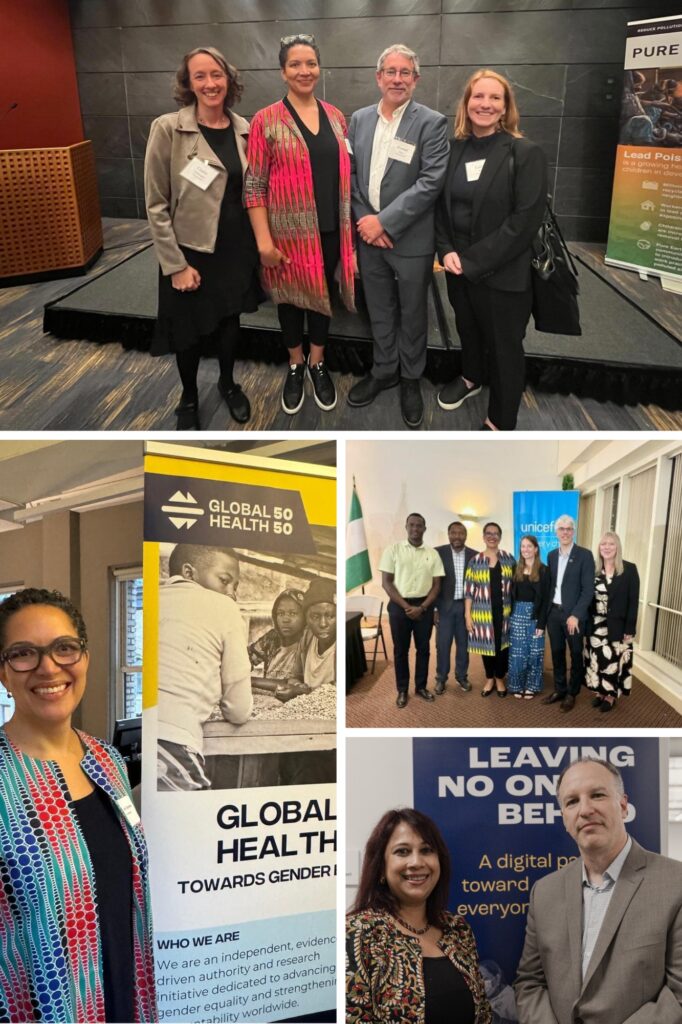My first months at the helm of Vital Strategies have reinforced my belief in the power of this organization to shape our collective futures. Our mission is simple: To reduce the global burden of noncommunicable diseases and injuries so people everywhere can live their healthiest and most vital lives.
Our team of over 400 people is dedicated to ensuring that everyone is protected by effective and equitable public health systems. They live in 43 countries, partnering with governments and local organizations across 80 countries to use data and evidence to move policy, practices and people toward sustainable progress in global health.
Together, they’ve supported governments in gathering millions of birth and death records, enabling better-informed public health policies. They’ve implemented graphic health warnings on tobacco packaging reaching 3 billion people across 32 countries, protecting future generations from the dangers of smoking. They’ve built air pollution surveillance systems to protect city residents from unhealthy air and developed communication campaigns that are changing public perceptions and reducing consumption of alcohol and ultra-processed foods.
They’ve established new cancer registries, improving diagnosis and access to treatment, and have advanced critical regulations on lead, protecting countless children from exposure and supporting their healthy development. The result: An invisible web of protections that make it easier for people to live their healthiest lives. The impact: Fewer lives lost to cancer, lung disease, cardiovascular disease, overdose, gender-based violence and road crashes.
As I dive into learning more about our people, our programs and our partners—including visiting our global offices—I will be seeking to better understand our challenges and identify opportunities to grow our impact. I am also acutely aware of the headwinds we face, especially in light of political currents and platforms that undermine the very bedrock of our work—data and science—eroding public trust and support. It will be a daunting task, but our team is resilient. We’ve navigated these challenges before with an unwavering commitment to our mission, our values, and the diverse communities we serve. We will do so again. We are also not alone in navigating this uncertain future. We have you: incredible partners, a strong global network of public health practitioners and advocates, and a group of committed and thoughtful funders, and I am immensely grateful for all of your continued support and collaboration.
It is a profound honor to lead Vital Strategies and chart our course for the road ahead. I remain excited and optimistic about our future, which is rooted in our vision for building responsive and resilient public health systems and builds on our strong legacy of advancing policies to protect health.
Together, we have the power to reimagine public health and drive Vital Strategies’ next season of impact together.
Sincerely,
Mary-Ann Etiebet, M.D.
President and Chief Executive Officer, Vital Strategies
Leaving No One Behind: A Digital Path Toward Counting Everyone
With one in four births and about 40% of deaths worldwide still unregistered, too many people remain invisible. Rights, services and protections are increasingly difficult to obtain without a legal identity and the means to prove it.
Our VitalTalks event brought together experts to discuss the United Nations mandate to record every birth and death, and the role digitalized civil registration and vital statistics (CRVS) systems must play to ensure everyone is counted.
Speakers at the event included:
- Jennifer Ellis, Data for Health Initiative, Bloomberg Philanthropies
- Mary-Ann Etiebet, President and CEO, Vital Strategies
- Ghislain Irakoze, Data Value Advocate, Global Partnership for Sustainable Development Data
- Josephine Mukesha, Director General at the National Identification Agency (NIDA) in Rwanda
- Sheema Sen Gupta, Director of Child Protection, UNICEF
- Philip Setel, Vice President, Civil Registration and Vital Statistics Program, Vital Strategies
Moderated by Shakuntala Santhiran (Shaks), international broadcast journalist and professional moderator.
Vital Strategies at the United Nations General Assembly

The Vital Strategies team joined 35+ events during the U.N. General Assembly’s 79th session, and CEO Mary-Ann Etiebet spent the week representing Vital at key events as well as meeting key partners and cultivating new relationships.
Our work on civil registration and vital statistics and childhood lead poisoning prevention were in the spotlight. The critical role of digitalization in CRVS success was the topic of the VitalTalks event at our New York office. Mary-Ann Etiebet spoke at a session at the Permanent Mission of Nigeria about the success Nigeria and Rwanda have had leveraging digital public infrastructure to achieve legal identity for all. Our Environmental Health colleagues represented Vital at UNICEF for the launch of the Partnership for a Lead-Free Future. Vital is a founding member of this essential initiative to protect children worldwide from the devastating harms of lead poisoning.
Beyond the events in New York, we were also present for important workshops and events around the world in recent weeks:
- We joined health leaders in Papua New Guinea in a multi-day Data-Centered Leadership Workshop as part of the Bloomberg Philanthropies Data for Health initiative, aimed at enhancing data skills and fostering a culture of data use.
- In Bangkok, our Partnership for Healthy Cities team worked with urban health champions from eight cities to exchange strategies to tackle NCDs and injuries, working toward healthier, safer, and more equitable environments. Just a week before, our team hosted a workshop in Mexico City focusing on urban mobility and road safety.
- We co-facilitated a Gender Data Analysis Workshop in Nairobi, Kenya, with 36 participants from five countries—India, Kenya, Liberia, South Africa and Vietnam.
- In Pune, India, our team joined Pure Earth, SFWB, and SHSRC Maharashtra to conduct a workshop to train medical officers on childhood blood lead surveillance.
